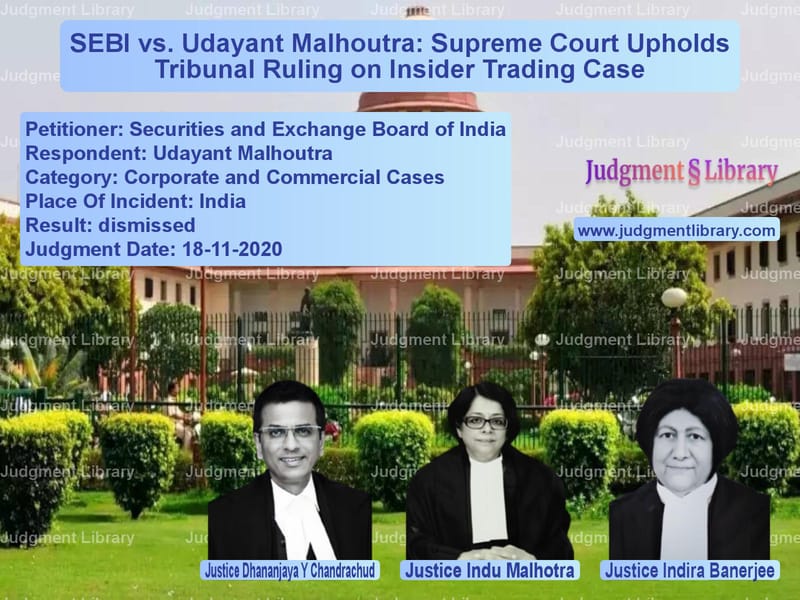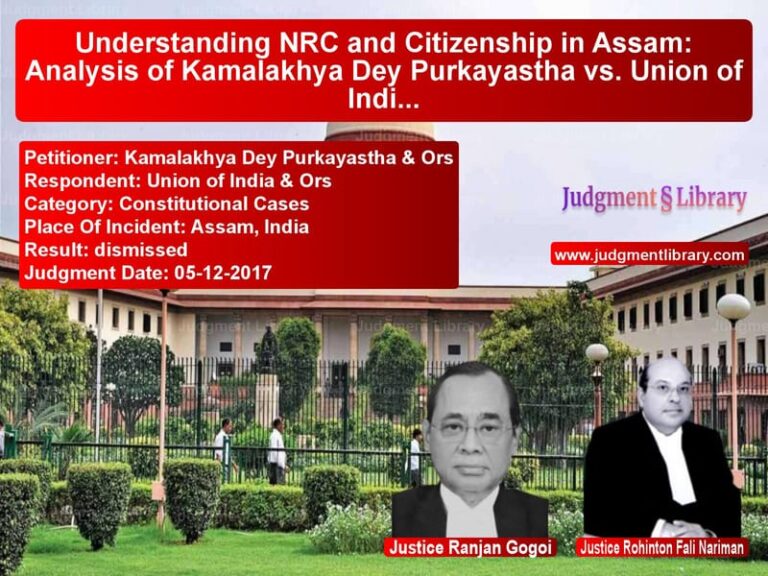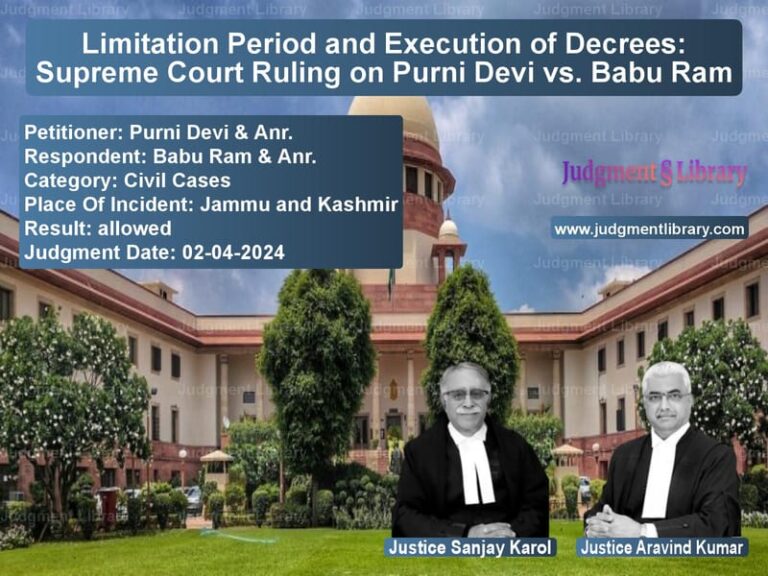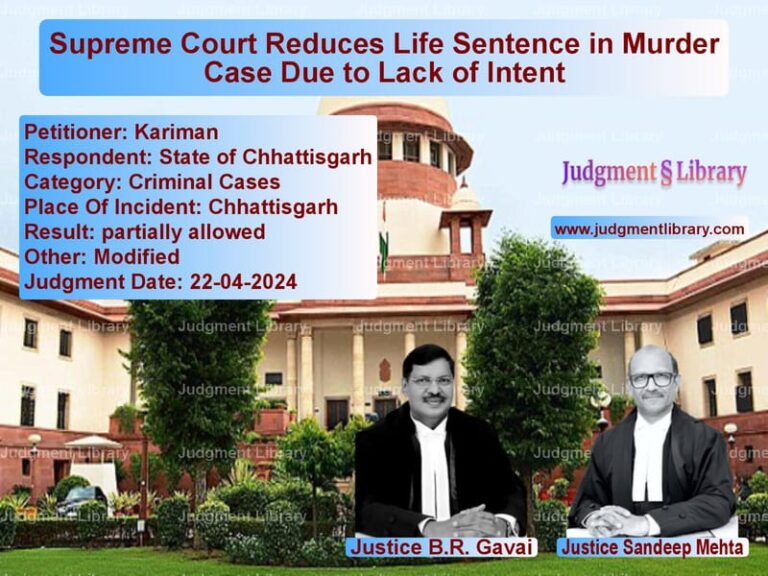SEBI vs. Udayant Malhoutra: Supreme Court Upholds Tribunal Ruling on Insider Trading Case
The Supreme Court of India recently ruled on an important case involving the Securities and Exchange Board of India (SEBI) and Udayant Malhoutra, the CEO and Managing Director of Dynamatic Technologies Ltd. The case revolved around allegations of insider trading, where SEBI had passed an ex-parte interim order against Malhoutra, directing him to deposit Rs 3.83 crore into an escrow account for allegedly selling company shares based on unpublished price-sensitive information.
Background of the Case
The case originated when SEBI investigated trades executed by Udayant Malhoutra in October 2016. SEBI alleged that Malhoutra had access to unpublished price-sensitive information (UPSI) regarding the company’s financial results for the quarter ending September 30, 2016. Before these financial results were officially announced on November 11, 2016, Malhoutra sold 51,000 shares of Dynamatic Technologies Ltd. SEBI argued that Malhoutra made a notional gain or avoided a potential loss by selling these shares before the negative financial results were disclosed to the public.
Following the investigation, SEBI’s Whole Time Member (WTM) passed an ex-parte interim order on June 15, 2020, directing Malhoutra to deposit Rs 3.83 crore in an escrow account, which was the estimated notional gain from the alleged insider trading.
Arguments by the Petitioner (SEBI)
SEBI, in its appeal before the Supreme Court, contended the following:
- The ex-parte interim order was necessary to prevent the potential diversion of funds.
- Malhoutra had inside knowledge of the company’s financial results and acted in a manner that violated the SEBI (Prohibition of Insider Trading) Regulations, 2015.
- The Securities Appellate Tribunal (SAT) had incorrectly set aside the ex-parte order, thereby weakening SEBI’s ability to regulate and prevent insider trading.
Arguments by the Respondent (Udayant Malhoutra)
Malhoutra, in his defense, presented the following arguments:
- The alleged trades took place in 2016, and SEBI did not act upon them until 2020, indicating no urgency.
- The ex-parte order was arbitrary and unnecessary, especially given the long delay in SEBI’s investigation.
- During the COVID-19 pandemic, requiring a significant deposit in an escrow account was unjustified and caused undue financial hardship.
Observations by the Securities Appellate Tribunal (SAT)
The Securities Appellate Tribunal ruled in favor of Malhoutra on June 27, 2020, and July 23, 2020. It held that:
“There is no real urgency in the matter to pass an ex-parte interim order, especially during the pandemic period.”
The Tribunal also emphasized that SEBI’s power to pass ex-parte interim orders should be exercised sparingly and only in cases of extreme urgency.
Supreme Court’s Verdict
The Supreme Court upheld SAT’s ruling, stating that SEBI had failed to demonstrate urgency in passing an ex-parte order. The Court noted that the investigation had been ongoing since 2017, and Malhoutra had provided the requested information in 2019. Given this timeline, the ex-parte order issued in June 2020 lacked the immediacy required to justify bypassing standard procedures.
On SEBI’s Power to Impound Proceeds
The Supreme Court also addressed an important legal question regarding SEBI’s authority under Section 11(4) of the SEBI Act. The provision states:
“The Board may, by an order, impound and retain the proceeds or securities in respect of any transaction which is under investigation.”
While the Court recognized SEBI’s authority to take preventive measures, it clarified that the Tribunal’s statement restricting SEBI’s power to impound proceeds should not be cited as a precedent in future cases.
Final Judgment
The Supreme Court ruled:
- SEBI’s ex-parte order was unjustified due to the lack of urgency.
- SAT’s decision to set aside the interim order was upheld.
- SEBI retains the authority to impound proceeds under Section 11(4), but its powers must be exercised judiciously.
- The specific legal interpretation provided by SAT should not be used as a precedent in future cases.
Conclusion
This case highlights the balance between regulatory enforcement and procedural fairness. While SEBI plays a crucial role in curbing insider trading, its actions must be justified and timely. The ruling reinforces the principle that regulatory bodies must act swiftly when imposing sanctions, and procedural safeguards should not be bypassed without clear justification. The decision serves as a significant precedent for future cases involving insider trading regulations and SEBI’s powers.
Petitioner Name: Securities and Exchange Board of India.Respondent Name: Udayant Malhoutra.Judgment By: Justice Dhananjaya Y Chandrachud, Justice Indu Malhotra, Justice Indira Banerjee.Place Of Incident: India.Judgment Date: 18-11-2020.
Don’t miss out on the full details! Download the complete judgment in PDF format below and gain valuable insights instantly!
Download Judgment: Securities and Excha vs Udayant Malhoutra Supreme Court of India Judgment Dated 18-11-2020.pdf
Direct Downlaod Judgment: Direct downlaod this Judgment
See all petitions in Corporate Compliance
See all petitions in Company Law
See all petitions in unfair trade practices
See all petitions in Judgment by Dhananjaya Y Chandrachud
See all petitions in Judgment by Indu Malhotra
See all petitions in Judgment by Indira Banerjee
See all petitions in dismissed
See all petitions in supreme court of India judgments November 2020
See all petitions in 2020 judgments
See all posts in Corporate and Commercial Cases Category
See all allowed petitions in Corporate and Commercial Cases Category
See all Dismissed petitions in Corporate and Commercial Cases Category
See all partially allowed petitions in Corporate and Commercial Cases Category







